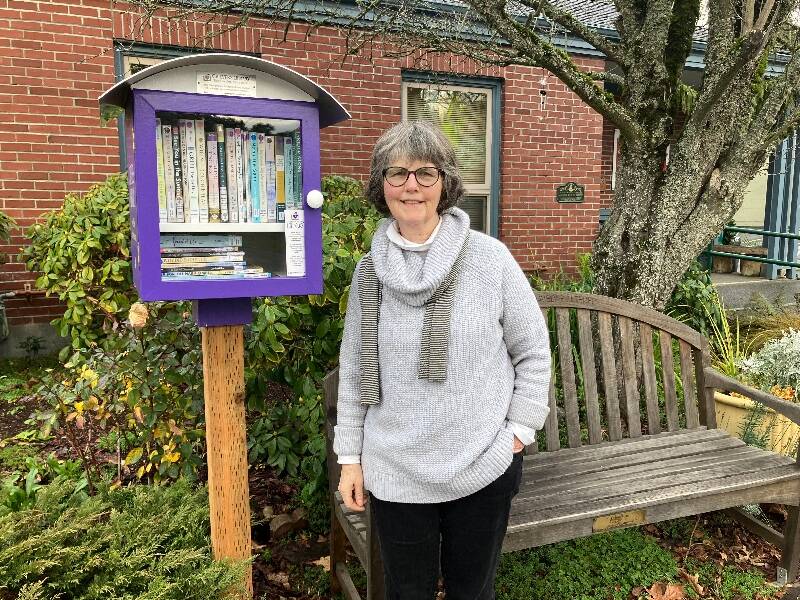Last month, a new resource was unveiled for islanders experiencing all the emotions and stages of grief — a sturdily handcrafted and brightly painted “little library” on Bank Road, outside of Vashon Senior Center.
The books inside the purple box — a curated and rotating library of about 25 volumes offered free of charge — are neatly cataloged, with tags affixed to the spine of each book stating its subject matter and whether it is intended for children, teens or adults.
Visitors to the box are urged to borrow any book they need and keep it for as long as they need it.
The Vashon box is one of four in nearby communities, including Seattle, Bainbridge, and Kingston, offered by The Griever’s Library, a Seattle-based, completely non-commercial and all-volunteer initiative founded to offer free “biblio-therapy” for people impacted by the death of a loved one or by life changes that bring a sense of deep loss.
The Grievers Library also supplies and curates two bookcases in the offices of the Journey program of Seattle Children’s Hospital, a free bereavement therapy program for families that have lost a child. In addition, the organization provides free grief books to King County’s Crisis Connections program as well as community officers at the Seattle Police Department to support local citizens dealing with traumatic loss from suicide or homicide.
The organization’s work, said Pamela Belyea, its volunteer project manager, “is a testament to the understanding that grief is an enduring experience, often overlooked or misunderstood in a society that rushes grievers towards closure.”
Working with a small army of volunteers and supporters, Belyea — the co-founder and director emerita of Gage Academy of Art, a licensed architect, and a cultural legacy planner — intends for the Griever’s Library to have an even wider reach through resources offered at its website, grieverslibrary.org.
At a talk at the Senior Center on Dec. 18, Belyea shared the story of the organization, which was born in the wake of her adult son’s death, by suicide, in 2020.
Navigating a previously unimaginable landscape of grief and emotional pain during that time, she turned to books.
“I hit a wall,” she said, using the terms “shattered,” “unable to function,” and having “grief brain,” to describe herself during that time.
“Having never met grief before, all I wanted to do was find relief, and I wasn’t looking for drugs,” she said. “…I discovered that I couldn’t get out of the chair, and I really couldn’t do anything. But books were useful to me.”
In reading, she said, she “discovered comfort, support, information, and hope in literature that had been written for grievers.”
Searching for books at her local library, she made another discovery: the Dewey Decimal system had only one number designated for grief, or rather, “bereavement,” and a catalog search using that number also yielded murder mysteries and thrillers — not what she was looking for.
“I’m a doer, and I’m also kind of an organizational nerd,” Belyea said — detailing how she began to find a way, during the darkest and most disorienting time of her life, to help not only herself but others as well.
Now, through a network of volunteers, donors, and collaborators, Belyea has amassed and distributed a library of hundreds of books related to grief, ranging from memoirs written by grievers, to children’s books, to self-help books written by professionals in the field.
The books, new and used, have come from a range of sources, including the Friends of the Seattle Public Library, as well as authors, retiring therapists, grievers, and other donors who have learned about the Griever’s Library.
All of these books are now cross-cataloged in a way that surpasses Dewey’s system.
Belyea has also recruited capstone library science students from the University of Washington to expand the project’s digital reach. Through this effort, grieverslibrary.org now links a curated selection of book recommendations to WorldCat.org, a global database compiled from more than 10,000 public libraries.
The website also offers a selection of “EZreads” — short excerpts from books, blogs and research articles that are sorted by different types of losses. The EZ read excerpts, Belyea said, are specially curated for new grievers who are typically unable to focus on any content for long.
“You didn’t learn about grief in high school or college, and your family doesn’t talk about it,” said Belyea. “It’s kind of a big unknown until it’s the elephant in your own room. So that’s why we created these EZreads, so that anyone can [find] them.”
Belyea called the Griever’s Library a “tortoise project,” saying its work to establish book boxes has been slow. Recalling the public launch of the library’s first book box in Seattle — which subsequently was vandalized and has now been removed — Belyea said that she understands the difficulty she faces in bringing up a subject that many would rather not talk about.
She lauded Vashon’s Senior Center and island volunteers who will help to maintain the book box on Bank Road.
In an op-ed written for the Seattle Times last year, Belyea wrote about the challenge of finding locations for the little libraries — a problem from the start of the project.
“After we received rejections from churches, libraries, businesses and local nonprofits, we proposed siting our book boxes in front of five Seattle community centers,” she wrote. “To our dismay, the progressive, compassionate civic leaders at Seattle Parks, Department of Transportation and City Hall responded in concert, ‘We don’t think it’s appropriate for them to be installed in parks or in front of community centers.’”
“This is our cultural allergy to grief at work,” she continued. “A grievers library is not a gruesome gravestone that belongs in a cemetery; it is a medicine cabinet filled with love potions that belongs on our streets — for easy dispensing to those afflicted with heartache and despair.”
Find out more at grieverslibrary.org or visit the Senior Center’s little library on Bank Road.



